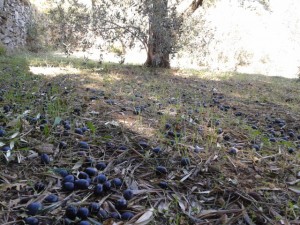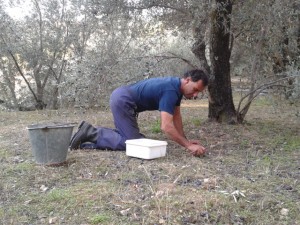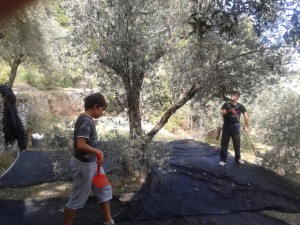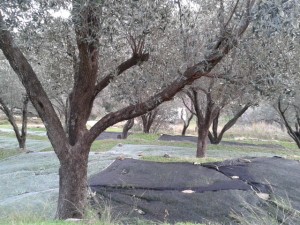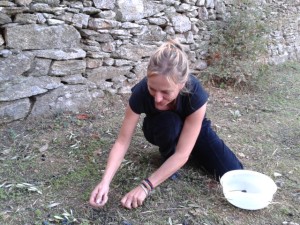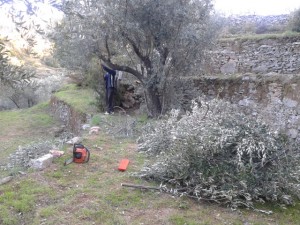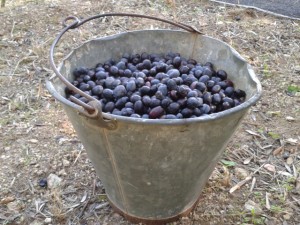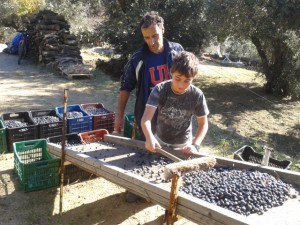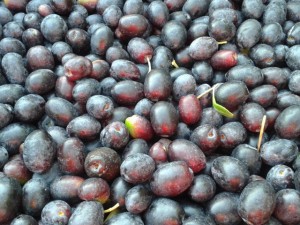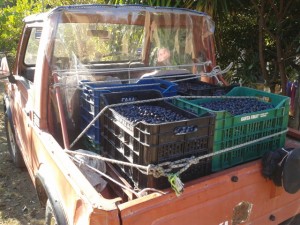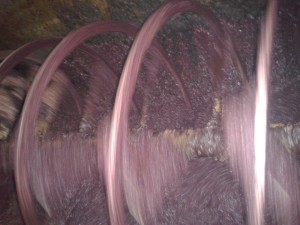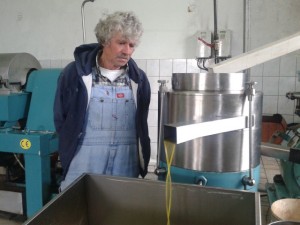The olive harvest begins like every year with a storm and the long-awaited rain comes. After a long, exceptionally dry summer, the Shirokkos, the south wind, raged for three days, and suddenly all the “early ripening” olives were on the ground. Hardly anyone had time to lay out their nets. In many places, olives look more like raisins than the juicy, plump fruits that are needed to produce oil.
Olive harvesting in Ikaria is a family affair. All hands are needed.
The most important thing about olive tree cultivation: you take care of the trees all year round. The terraces must be kept clean and, if possible, cleared of dried grass stubble, bushes, stones and thorns in the autumn shortly before the harvest time, because this makes the harvest much easier if you don’t want to pick out the valuable olives from between the bushes and thorns later.
The real harvest time lasts from the end of October to February and nothing has changed in the harvesting of this valuable fruit for thousands of years.
Harvesting begins when the hard green fruits become juicy and softer and their color slowly turns yellowish and then dark. This depends very much on the weather and location. All the fruits never ripen at the same time, not even on the same tree, which of course makes harvesting more difficult.
Using long wooden poles, which are made from the branches of the mulberry tree because they are particularly long and elastic, the olives are gently shaken from the trees and then collected by hand. For the lower hanging branches, small plastic rakes are now used to “comb” the olives from the branches. Nets are laid out under the trees, but this sometimes requires acrobatic skills on the narrow terraces and steep slopes in Ikaria.
The nets are collected and laid out again, because with this gentle method only the ripe olives fall from the trees. And of course you’re hunched over all day, crawling around on the floor, trying not to leave any of these fruits lying around and ignoring your aching knees and back.
This year the weather gods have been kind to us because it is windy and rainy, but reasonably warm, because as soon as the cold breeze sets in, you need really good nerves and stamina for this strenuous work!
But technology hasn’t stopped in Ikaria either. Some impatient farmers use vibrating machines, which are held as a kind of propeller on a long pole in the trees and mill down olives, leaves, fine branches, everything together, regardless of the losses. It speeds up and makes harvesting much easier, but the damaged tree won’t thank you because it has to recover and form new branch tips.
However, targeted pruning and thinning is good for every tree.
This is the next arduous task after the harvest. You try to keep the trees as round and low as possible,
which makes harvesting easier next year because the fruits will also be larger. Olive trees have a virtually unlimited age and continually rejuvenate by producing new shoots every spring.
The Italian occupiers were the first to trim the trees in Ikaria. Pantelis, my husband’s grandfather, would have been found by his family crying and pulling their hair out under the pruned olive trees. He believed the occupiers wanted to punish him and that was why they had damaged his beloved trees like this…!
In general, the olive trees in Ikaria are not as old as elsewhere. Ikaria has been a wine island since ancient times and all terraces were planted with vines. In great-grandfather’s time, olive oil was so rare and valuable that his mother used a rooster feather to add it drop by drop to every plate! It’s hard to imagine today when you consider how generously the Icariots cook with oil these days!
The olive slide, a practical invention by Pantelis, my husband, which has since found imitators! It is used to clean the leaves and twigs from the olives that have been collected, because in the village press, only some of them are washed out. The rest is simply ground up and then makes the oil bitter.
After the harvest, the collected olives are brought to the mill in sacks. So that they don’t suffocate and get crushed on the way, we prefer to put them in small boxes on our farm. This guarantees a fresh, aromatic oil. We bring them into the press in small quantities no later than the day after the harvest, so the olives stay fresh and this in turn determines the acidity of the oil.
In the village mill, the olives are washed and ground together with the pits into a thick paste. The oil is then separated from the pulp using centrifugal force. This is a gentle method, our oil is pressed at a temperature below 30 degrees and this is how we get our special, cold-pressed oil.
Then comes the exciting moment: the acidity is measured. Now it depends on whether you only collected the beautiful, intact olives or the rotten olives, the harvesting method, the storage method and duration, as well as the processing process all play an important role.
Our oil is always below 0.5%. We are very proud of this!
The farmers stay in the mill for hours to make sure that their olives are not mixed with those of other farmers. Time for a chat or even a glass of tsipouro after all the hard work.
If you are lucky enough to get fresh olives, you can pickle them yourself. I would like to explain to you how we do it in Ikaria. Pickle your own olives…
But you can also improve the taste of purchased olives by pickling them and easily make gourmet olives.
If you are lucky enough to get fresh olives, you can pickle them yourself. I would like to explain to you how we do it in Ikaria. Pickle your own olives…
But you can also improve the taste of purchased olives by pickling them and easily make gourmet olives.
Book recommendation
Nikos and Maria Psilakis
“The culture of the olive – olive oil”
One of the best publications about olive oil, the history of the olive, its application and uses. Very attractively designed, exciting and informatively written with lots of recipes. Nikos Psilakis was in military service in Ikaria for a few months in 1979 and therefore knows our island personally.
By the way, the book is a great souvenir from Greece!
KARMANOR
ISBN 960-7448-19-7

